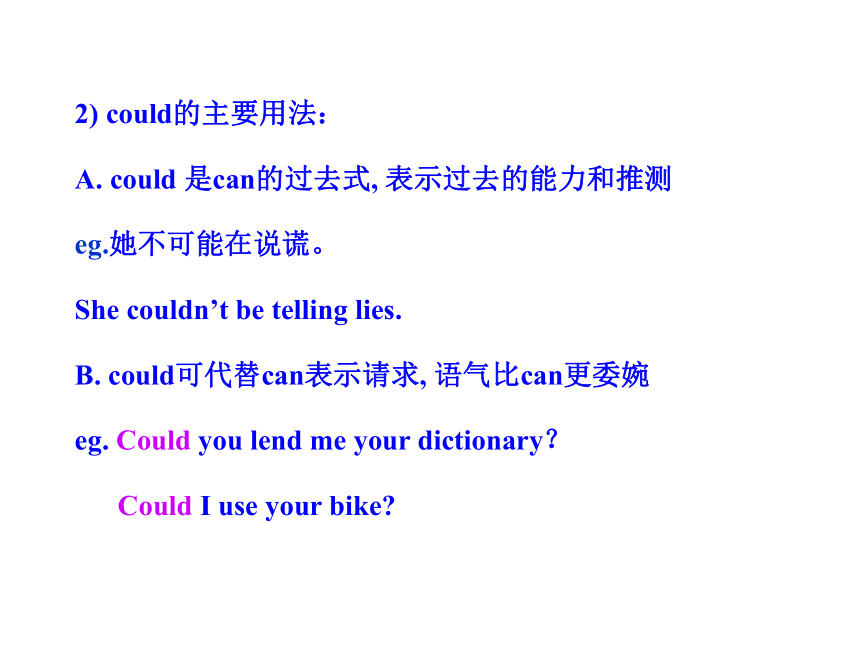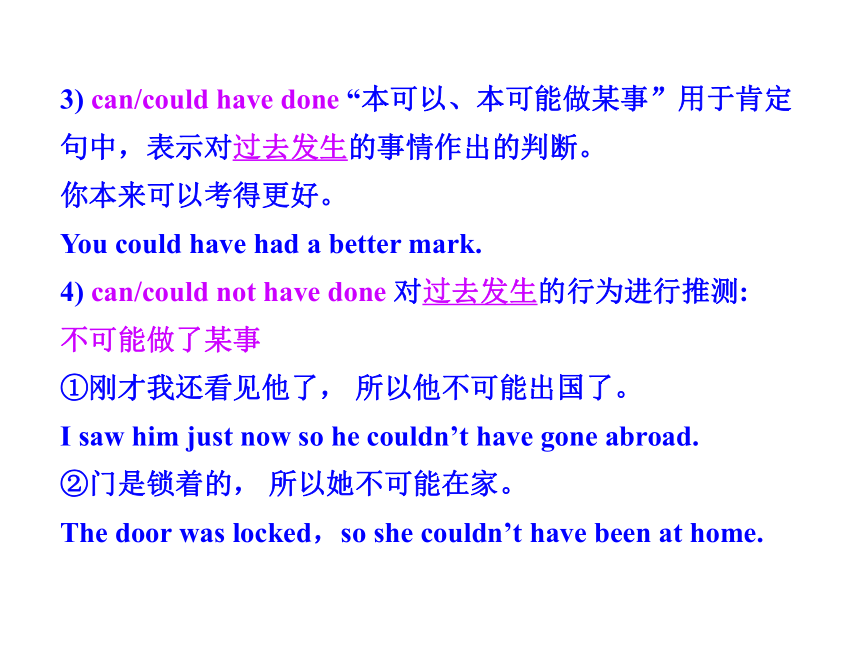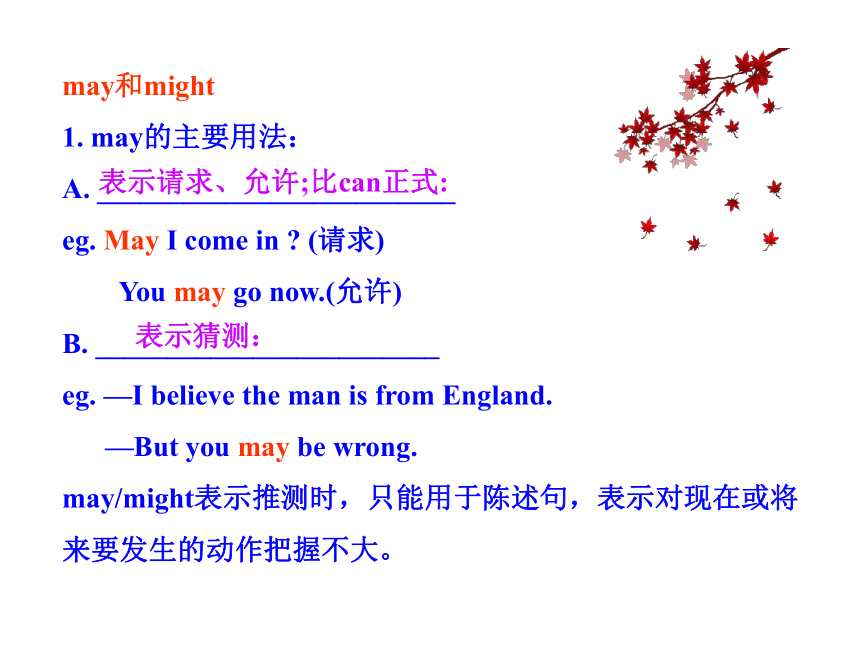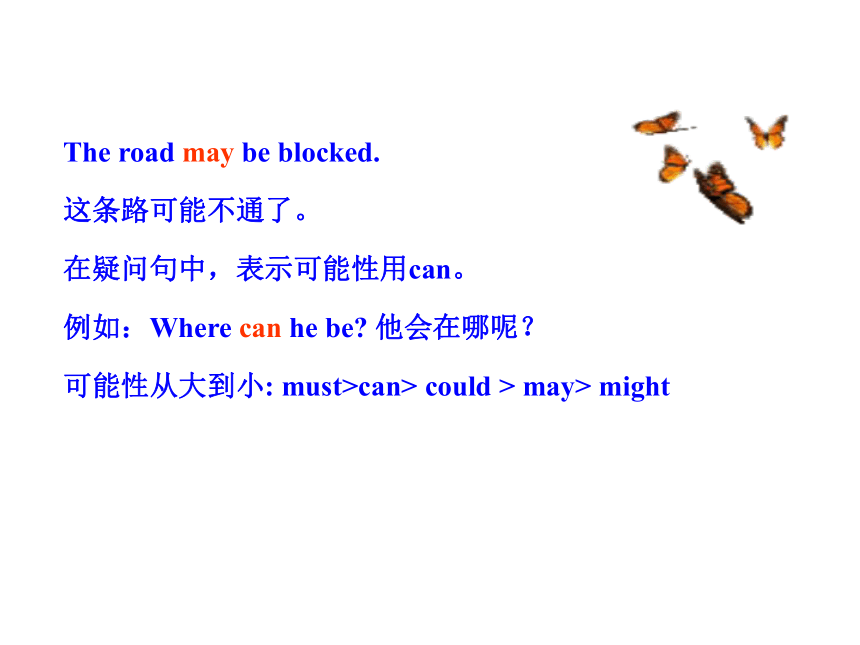【语法攻略】2014届高三英语总复习专项课件:情态动词(36张PPT)
文档属性
| 名称 | 【语法攻略】2014届高三英语总复习专项课件:情态动词(36张PPT) |  | |
| 格式 | zip | ||
| 文件大小 | 437.4KB | ||
| 资源类型 | 教案 | ||
| 版本资源 | |||
| 科目 | 英语 | ||
| 更新时间 | 2013-12-24 21:30:08 | ||
图片预览












文档简介
课件38张PPT。情态动词情态动词是一种本身有一定的词义,但要与动词原形及其被动语态一起使用,给谓语动词增添情态色彩,表示说话人对有关行为或事物的态度和看法,认为其可能、应该或必要等。情态动词后面加动词原形。什么是情态动词?情态动词的语法特征
1. 情态动词有一定的意义,只表示期待或估计某事的发生,不能表示正在发生或已经发生的事情。
2. 没有人称和数的变化,即情态动词第三人称单数不加-s。
3. 不能独立使用,它和后面的动词构成谓语。
4. 情态动词除ought?和have?外,后面只能接动词原形。
5. ?情态动词没有非谓语形式,即没有不定式、分词等形式。
常见情态动词: can/could, may/might, ought to, must, need, dare, shall/should, will/would, have to, used to表示能力表示可能性表请求或允许 can 和could:
1) can的主要用法:
? A.? __________:
? eg. The girl can dance very well.
B.? ____________:
eg. Can the news be true?
C. _____________:
eg. Can I sit here? 2) could的主要用法:
A. could 是can的过去式, 表示过去的能力和推测
eg.她不可能在说谎。
She couldn’t be telling lies.
B. could可代替can表示请求, 语气比can更委婉
eg. Could you lend me your dictionary?
Could I use your bike?3) can/could have done “本可以、本可能做某事”用于肯定句中,表示对过去发生的事情作出的判断。
你本来可以考得更好。
You could have had a better mark.
4) can/could not have done 对过去发生的行为进行推测:
不可能做了某事
①刚才我还看见他了, 所以他不可能出国了。
I saw him just now so he couldn’t have gone abroad.
②门是锁着的, 所以她不可能在家。
The door was locked,so she couldn’t have been at home.may和might
1. may的主要用法:
A. _________________________
eg. May I come in ? (请求)
You may go now.(允许)
B. ________________________
eg. —I believe the man is from England.
—But you may be wrong.
may/might表示推测时,只能用于陈述句,表示对现在或将来要发生的动作把握不大。表示请求、允许;比can正式:表示猜测:The road may be blocked.
这条路可能不通了。
在疑问句中,表示可能性用can。
例如:Where can he be? 他会在哪呢?
可能性从大到小: must>can> could > may> might表示祝愿;语气较正式:C. _______________________
eg. May you succeed!
May you have a good journey!
2.might 的用法:
多在间接引语中表示过去的可能和允许。
She said that he might take her bike.
她说他可以拿她的自行车去用。3.might/may have done,表示对过去发生的动作进行表示可能性的推测。
他可能去医务室了。
He may have gone to the clinic.
他可能已经从报纸上知道这个消息了。
He might have read about the news in the newspaper.(助动词)?(情态动词)will和would:
1. _________________________
用于构成将来时是助动词。
用于表“意志/决心/请求”时是情态动词。
would亦同理。
I will tell you something important.
我将要告诉你一些重要的事。
Will you tell her that I’m here?
请您告诉她说我在这儿,好吗? ? will是助动词或是情态动词。2. _______________________________________
①If you want help, let me know, will you?
如果你需要帮助, 让我知道, 好吗?
? ②Will you type this, please?
请打印这个,好吗? ?
③Won’t you sit down?
请坐下,好吗? will在疑问句中用于第二人称,表提出请求。(表请求)(表意愿)(表许可)3. _________________________
①Would you help us, please?
请您帮助我们,好吗?
②I’d go there with you.
我要和你一块到那儿去。?
③Teacher wouldn’t allow it.
老师不会允许这件事。would比will语气委婉。shall ,should 和ought to
1.在陈述句中,shall用于第二、三人称,表示允诺、警告、命令、决心等。
You shall do as I say. (命令)
Nothing shall stop me doing it. (决心)
Tell him that he shall have the book tomorrow. (允诺)
2.在疑问句中,用于第一、三人称,表示请求或征求意见。
Shall I open the window for you?(征求意见)
Shall he fetch some water for you?(请求)
shall用于构成将来时是助动词,用于表示允诺、警告、命令、决心和请求或征求意见时,是情态动词3. should常表示劝告、建议、命令,与ought to意义相近,但ought to多表示责任、义务,语气强烈。
Young people should learn how to use computers.
Every citizen ought to obey law.
You ought not to go.4.should/ought to have done表示责备或批评,意为“本应该……但”,ought to的语气更强烈,用于否定则表示“本不该……但”。
You should/ought to have told her the truth earlier.
She shouldn’t have left without saying a word.
5.Should用于表示可能性的推测时,表“应该,很可能”。
They left at 5:30. They should get there now.表示必然性。表示强制/义务。must must 的主要用法: 1. _____________ eg: We must all die. 人总要死的。 2. ______________ eg: You must get up early. 你必须早起来。例如:We mustn’t waste our time.
— May I take this magazine out?
— No, you mustn’t.
注意: must not “禁止”。
must 用于一般疑问句的时候,肯定回答用yes, please 等,其否定回答用 needn’t 或者 don’t have to。must 表示推测时, 只能用于肯定句。
must do 对一般时的肯定推测
must be doing 对现在的动作进行肯定推测
must have done 对过去发生的事情作出的肯定判断
①他们买了一辆新车。 他们一定很有钱。
They have bought a new car. They must have a lot of money.
②他现在一定在看小说.
He must be reading novels now.
③路是湿的。昨天晚上一定下雨了。
The road is wet. It must have rained last night.need
1.作情态动词时,仅用于否定或疑问句,后接动词原形,表“需要”。
You needn’t return the book now.
—Need he start from the beginning?
— Yes, he must. /— No, he needn’t/doesn’t have to. 2.needn’t have done 表示做了本不必要做的事情,意为“ 本不必要……”。
Our color TV set is still good enough. You needn’t have bought a new one.
3.need作实义动词时,表示“需要”,有人称、时态和数的变化。
He needs to finish it this evening.
The classroom needs cleaning.可兼作实义动词的情态动词:need,dare
1.作为情态动词用,常用在否定句和疑问句中。
Dare (Need) +S (主语) +V (动词原形)
S + daren’t (needn’t) +V
①I daren’t walk through the forest at night.
②Dare you walk through the forest at night?
③You needn’t return the book now.
④Need he go yesterday?2.作实义动词用,常用在肯定句中, 有人称、时态和数的变化。
①He needs to go there himself.
②He has grown up, we don’t need to worry about him.
3.sth. (sb.) need( want, request)+ doing/ to be done.
①The house needs cleaning/ to be cleaned.
②The boy needs sending to the hospital at once.
③The plants want watering every day. =The plants want to be watered every day. 句型 时 态 动 词
情态动词dare 实义动词 dare
肯定句
现在时 dare do dare/dares to do
过去时 dared do dared to do
否定句
现在时 daren’t/dare not do do/does not dare (to) do
过去时 dared not do did not dare (to) do
疑问句
现在时 Dare he do? Do you/Does he dare (to) do?
过去时 Dared he do? Did he dare (to) do 【高考链接】1.(2012·全国卷Ⅱ)I’m going to Europe on vacation together with John if I ______ find the money.
A. can B. might C. would D. need
【解析】选A。考查情态动词。句意:如果我能弄到钱,我会与约翰一起去欧洲度假。从主句的时态形式来看,该句不是虚拟语气,而是真实条件,所以用can表示“能够”,相当于be able to; might表示更小的可能性; would表示意愿; need必要。 2. (2012·全国卷Ⅰ) I______ use a clock to wake me up because at six o’clock each morning the train comes by my house.
A. couldn’t B. mustn’t C. shouldn’t D. needn’t
【解析】选D。考查情态动词。句意:我不需要用闹钟来叫醒我,因为每天早晨六点钟,火车就从我家附近经过。couldn’t 不能;mustn’t 一定不要;shouldn’t 不应该;needn’t不需要。根据句意可知,此处表示“不需要做某事”, 所以选D。3. (2012·江西高考)We ______ have bought so much food now that Suzie won’t be with us for dinner.
A. may not B. needn’t
C. can’t D. mustn’t
【解析】选B。考查情态动词。句意:既然苏西不和我们一起吃饭,我们没必要买如此多的食物。情态动词+have done结构在此句子中表示对过去事情的推测、遗憾、责备等,needn’t have bought意思是“本没必要买”。A项意为“不可能”;B项意为“没必要”;C项意为“一定不会”;D项意为“一定不要”。判断正误:
How dare you say such a thing?
How dare you to say such a thing?
He daren’t to speak English before such a crowd, did he?
He daren’t speak English before such a crowd, dare he?
dare用作情态动词时,表示“敢于”,主要用于疑问句、否定句及条件从句。【课堂训练】Nobody need to be afraid of catching the disease.
Nobody need be afraid of catching the disease.
These dishes need be cleaned carefully.
These dishes need to be cleaned carefully.
These dishes need cleaning carefully.
need作情态动词,通常用在疑问句、否定句中,或与条件句、whether/hardly/nobody等连用。因need不能用于肯定句,因此肯定回答要用must。例如: —Need I stay here any longer?
我需要在这儿呆下去吗?
—No, you needn’t. ——不需要。
/—Yes, you must. ——是的,需要呆下去。B表示请求1. —______ I go out to play, mum?
—No, you_____. You should do your homework first.
A. Might; wouldn’t
B. May; had better not
C. Must; mustn’t
D. Need; mustn’t最好不要2. —Where is Emma?
—I can’t say for sure where she is, but she_____ be out
shopping.
A. can
B. should
C. must
D. mayD表示推测,把握不大3. The room is in a terrible mess; it ______ cleaned.
A. can’t have been B. couldn’t be
C. may have been D. would be
【解析】选A。房间实在是太乱了;所以它不可能已经被打扫过。can/could not have done 对过去发生的行为进行推测“不可能做某事”。A4. How____ you say that you really understand the whole story if you have covered only a part of the article?
A. can B. must C. need D. may
【解析】选A。 may 在这里有一种“可能的”的意思,而且从语感的角度讲也不顺。而can指的是一种能力,这里说的是“你怎么‘可以’在只看了一部分这个电视节目的情况下就说你已经懂了整个故事呢?” 所以,这里的意思显然是表达一种能力。故选A。A5. There ____ be any difficulty about passing the road test since you have practised a lot in the driving school.
A. mustn’t B. shan’t
C. shouldn’t D. needn’t
【解析】既然你已经在驾驶学校练习了这么多,要通过道路考试不应该有任何困难的。mustn’t “不可以”;shan’t 是shall not的缩写,而shall 用于陈述句中的第二、三人称,表示说话人的意图、允诺、警告、命令、 决心等,“必须, 应”, 也是不对的。 needn’t “不必”。因此答案为C选项。C6. —Jane has just come back from China and she looks happy.
— She ______ her trip very much.
must enjoy B. must have enjoyed
C. may enjoy D. should have enjoyedBmust have done肯定做了7.You can’t imagine that a well-behaved gentleman ______ be so rude to a lady.
A. might B. need
C. should D. would
【解析】选C。你无法想像一个有修养的绅士竟然会对一位女士如此粗鲁。should有“竟然”的意思,是一种特殊用法。
8.I often see lights in that empty house. Do you think I ______ report it to the police?
A. should B. may C. will D. can CA应该表惊讶的语气BD9.—When can I come for the photos? I need them tomorrow afternoon.
—They _____ be ready by 12:00.
A. can B. should C. might D. need
10.There was plenty of time. She_____.
A. mustn’t have hurried
B. couldn’t have hurried
C. mustn’t hurried
D. needn’t have hurried 本不必做但做了
1. 情态动词有一定的意义,只表示期待或估计某事的发生,不能表示正在发生或已经发生的事情。
2. 没有人称和数的变化,即情态动词第三人称单数不加-s。
3. 不能独立使用,它和后面的动词构成谓语。
4. 情态动词除ought?和have?外,后面只能接动词原形。
5. ?情态动词没有非谓语形式,即没有不定式、分词等形式。
常见情态动词: can/could, may/might, ought to, must, need, dare, shall/should, will/would, have to, used to表示能力表示可能性表请求或允许 can 和could:
1) can的主要用法:
? A.? __________:
? eg. The girl can dance very well.
B.? ____________:
eg. Can the news be true?
C. _____________:
eg. Can I sit here? 2) could的主要用法:
A. could 是can的过去式, 表示过去的能力和推测
eg.她不可能在说谎。
She couldn’t be telling lies.
B. could可代替can表示请求, 语气比can更委婉
eg. Could you lend me your dictionary?
Could I use your bike?3) can/could have done “本可以、本可能做某事”用于肯定句中,表示对过去发生的事情作出的判断。
你本来可以考得更好。
You could have had a better mark.
4) can/could not have done 对过去发生的行为进行推测:
不可能做了某事
①刚才我还看见他了, 所以他不可能出国了。
I saw him just now so he couldn’t have gone abroad.
②门是锁着的, 所以她不可能在家。
The door was locked,so she couldn’t have been at home.may和might
1. may的主要用法:
A. _________________________
eg. May I come in ? (请求)
You may go now.(允许)
B. ________________________
eg. —I believe the man is from England.
—But you may be wrong.
may/might表示推测时,只能用于陈述句,表示对现在或将来要发生的动作把握不大。表示请求、允许;比can正式:表示猜测:The road may be blocked.
这条路可能不通了。
在疑问句中,表示可能性用can。
例如:Where can he be? 他会在哪呢?
可能性从大到小: must>can> could > may> might表示祝愿;语气较正式:C. _______________________
eg. May you succeed!
May you have a good journey!
2.might 的用法:
多在间接引语中表示过去的可能和允许。
She said that he might take her bike.
她说他可以拿她的自行车去用。3.might/may have done,表示对过去发生的动作进行表示可能性的推测。
他可能去医务室了。
He may have gone to the clinic.
他可能已经从报纸上知道这个消息了。
He might have read about the news in the newspaper.(助动词)?(情态动词)will和would:
1. _________________________
用于构成将来时是助动词。
用于表“意志/决心/请求”时是情态动词。
would亦同理。
I will tell you something important.
我将要告诉你一些重要的事。
Will you tell her that I’m here?
请您告诉她说我在这儿,好吗? ? will是助动词或是情态动词。2. _______________________________________
①If you want help, let me know, will you?
如果你需要帮助, 让我知道, 好吗?
? ②Will you type this, please?
请打印这个,好吗? ?
③Won’t you sit down?
请坐下,好吗? will在疑问句中用于第二人称,表提出请求。(表请求)(表意愿)(表许可)3. _________________________
①Would you help us, please?
请您帮助我们,好吗?
②I’d go there with you.
我要和你一块到那儿去。?
③Teacher wouldn’t allow it.
老师不会允许这件事。would比will语气委婉。shall ,should 和ought to
1.在陈述句中,shall用于第二、三人称,表示允诺、警告、命令、决心等。
You shall do as I say. (命令)
Nothing shall stop me doing it. (决心)
Tell him that he shall have the book tomorrow. (允诺)
2.在疑问句中,用于第一、三人称,表示请求或征求意见。
Shall I open the window for you?(征求意见)
Shall he fetch some water for you?(请求)
shall用于构成将来时是助动词,用于表示允诺、警告、命令、决心和请求或征求意见时,是情态动词3. should常表示劝告、建议、命令,与ought to意义相近,但ought to多表示责任、义务,语气强烈。
Young people should learn how to use computers.
Every citizen ought to obey law.
You ought not to go.4.should/ought to have done表示责备或批评,意为“本应该……但”,ought to的语气更强烈,用于否定则表示“本不该……但”。
You should/ought to have told her the truth earlier.
She shouldn’t have left without saying a word.
5.Should用于表示可能性的推测时,表“应该,很可能”。
They left at 5:30. They should get there now.表示必然性。表示强制/义务。must must 的主要用法: 1. _____________ eg: We must all die. 人总要死的。 2. ______________ eg: You must get up early. 你必须早起来。例如:We mustn’t waste our time.
— May I take this magazine out?
— No, you mustn’t.
注意: must not “禁止”。
must 用于一般疑问句的时候,肯定回答用yes, please 等,其否定回答用 needn’t 或者 don’t have to。must 表示推测时, 只能用于肯定句。
must do 对一般时的肯定推测
must be doing 对现在的动作进行肯定推测
must have done 对过去发生的事情作出的肯定判断
①他们买了一辆新车。 他们一定很有钱。
They have bought a new car. They must have a lot of money.
②他现在一定在看小说.
He must be reading novels now.
③路是湿的。昨天晚上一定下雨了。
The road is wet. It must have rained last night.need
1.作情态动词时,仅用于否定或疑问句,后接动词原形,表“需要”。
You needn’t return the book now.
—Need he start from the beginning?
— Yes, he must. /— No, he needn’t/doesn’t have to. 2.needn’t have done 表示做了本不必要做的事情,意为“ 本不必要……”。
Our color TV set is still good enough. You needn’t have bought a new one.
3.need作实义动词时,表示“需要”,有人称、时态和数的变化。
He needs to finish it this evening.
The classroom needs cleaning.可兼作实义动词的情态动词:need,dare
1.作为情态动词用,常用在否定句和疑问句中。
Dare (Need) +S (主语) +V (动词原形)
S + daren’t (needn’t) +V
①I daren’t walk through the forest at night.
②Dare you walk through the forest at night?
③You needn’t return the book now.
④Need he go yesterday?2.作实义动词用,常用在肯定句中, 有人称、时态和数的变化。
①He needs to go there himself.
②He has grown up, we don’t need to worry about him.
3.sth. (sb.) need( want, request)+ doing/ to be done.
①The house needs cleaning/ to be cleaned.
②The boy needs sending to the hospital at once.
③The plants want watering every day. =The plants want to be watered every day. 句型 时 态 动 词
情态动词dare 实义动词 dare
肯定句
现在时 dare do dare/dares to do
过去时 dared do dared to do
否定句
现在时 daren’t/dare not do do/does not dare (to) do
过去时 dared not do did not dare (to) do
疑问句
现在时 Dare he do? Do you/Does he dare (to) do?
过去时 Dared he do? Did he dare (to) do 【高考链接】1.(2012·全国卷Ⅱ)I’m going to Europe on vacation together with John if I ______ find the money.
A. can B. might C. would D. need
【解析】选A。考查情态动词。句意:如果我能弄到钱,我会与约翰一起去欧洲度假。从主句的时态形式来看,该句不是虚拟语气,而是真实条件,所以用can表示“能够”,相当于be able to; might表示更小的可能性; would表示意愿; need必要。 2. (2012·全国卷Ⅰ) I______ use a clock to wake me up because at six o’clock each morning the train comes by my house.
A. couldn’t B. mustn’t C. shouldn’t D. needn’t
【解析】选D。考查情态动词。句意:我不需要用闹钟来叫醒我,因为每天早晨六点钟,火车就从我家附近经过。couldn’t 不能;mustn’t 一定不要;shouldn’t 不应该;needn’t不需要。根据句意可知,此处表示“不需要做某事”, 所以选D。3. (2012·江西高考)We ______ have bought so much food now that Suzie won’t be with us for dinner.
A. may not B. needn’t
C. can’t D. mustn’t
【解析】选B。考查情态动词。句意:既然苏西不和我们一起吃饭,我们没必要买如此多的食物。情态动词+have done结构在此句子中表示对过去事情的推测、遗憾、责备等,needn’t have bought意思是“本没必要买”。A项意为“不可能”;B项意为“没必要”;C项意为“一定不会”;D项意为“一定不要”。判断正误:
How dare you say such a thing?
How dare you to say such a thing?
He daren’t to speak English before such a crowd, did he?
He daren’t speak English before such a crowd, dare he?
dare用作情态动词时,表示“敢于”,主要用于疑问句、否定句及条件从句。【课堂训练】Nobody need to be afraid of catching the disease.
Nobody need be afraid of catching the disease.
These dishes need be cleaned carefully.
These dishes need to be cleaned carefully.
These dishes need cleaning carefully.
need作情态动词,通常用在疑问句、否定句中,或与条件句、whether/hardly/nobody等连用。因need不能用于肯定句,因此肯定回答要用must。例如: —Need I stay here any longer?
我需要在这儿呆下去吗?
—No, you needn’t. ——不需要。
/—Yes, you must. ——是的,需要呆下去。B表示请求1. —______ I go out to play, mum?
—No, you_____. You should do your homework first.
A. Might; wouldn’t
B. May; had better not
C. Must; mustn’t
D. Need; mustn’t最好不要2. —Where is Emma?
—I can’t say for sure where she is, but she_____ be out
shopping.
A. can
B. should
C. must
D. mayD表示推测,把握不大3. The room is in a terrible mess; it ______ cleaned.
A. can’t have been B. couldn’t be
C. may have been D. would be
【解析】选A。房间实在是太乱了;所以它不可能已经被打扫过。can/could not have done 对过去发生的行为进行推测“不可能做某事”。A4. How____ you say that you really understand the whole story if you have covered only a part of the article?
A. can B. must C. need D. may
【解析】选A。 may 在这里有一种“可能的”的意思,而且从语感的角度讲也不顺。而can指的是一种能力,这里说的是“你怎么‘可以’在只看了一部分这个电视节目的情况下就说你已经懂了整个故事呢?” 所以,这里的意思显然是表达一种能力。故选A。A5. There ____ be any difficulty about passing the road test since you have practised a lot in the driving school.
A. mustn’t B. shan’t
C. shouldn’t D. needn’t
【解析】既然你已经在驾驶学校练习了这么多,要通过道路考试不应该有任何困难的。mustn’t “不可以”;shan’t 是shall not的缩写,而shall 用于陈述句中的第二、三人称,表示说话人的意图、允诺、警告、命令、 决心等,“必须, 应”, 也是不对的。 needn’t “不必”。因此答案为C选项。C6. —Jane has just come back from China and she looks happy.
— She ______ her trip very much.
must enjoy B. must have enjoyed
C. may enjoy D. should have enjoyedBmust have done肯定做了7.You can’t imagine that a well-behaved gentleman ______ be so rude to a lady.
A. might B. need
C. should D. would
【解析】选C。你无法想像一个有修养的绅士竟然会对一位女士如此粗鲁。should有“竟然”的意思,是一种特殊用法。
8.I often see lights in that empty house. Do you think I ______ report it to the police?
A. should B. may C. will D. can CA应该表惊讶的语气BD9.—When can I come for the photos? I need them tomorrow afternoon.
—They _____ be ready by 12:00.
A. can B. should C. might D. need
10.There was plenty of time. She_____.
A. mustn’t have hurried
B. couldn’t have hurried
C. mustn’t hurried
D. needn’t have hurried 本不必做但做了
同课章节目录
- 词法
- 名词
- 动词和动词短语
- 动词语态
- 动词时态
- 助动词和情态动词
- 非谓语动词
- 冠词
- 代词
- 数词和量词
- 形容词副词及其比较等级
- 介词和介词短语
- 连词和感叹词
- 构词法
- 相似、相近词比较
- 句法
- 陈述句
- 一般疑问句和否定疑问句
- 特殊疑问句及选择疑问句
- 反意疑问句
- 存在句(There be句型)
- 宾语从句
- 定语从句
- 状语从句
- 主谓一致问题
- 简单句
- 并列句
- 复合句
- 主谓一致
- 主、表语从句
- 名词性从句
- 直接引语和间接引语
- 虚拟语气
- 感叹句
- 强调句
- 倒装句
- 祈使句
- 句子的成分
- 句子的分类
- 题型专区
- 单项选择部分
- 易错题
- 完形填空
- 阅读理解
- 词汇练习
- 听说训练
- 句型转换
- 补全对话
- 短文改错
- 翻译
- 书面表达
- 任务型阅读
- 语法填空
- 其他资料
